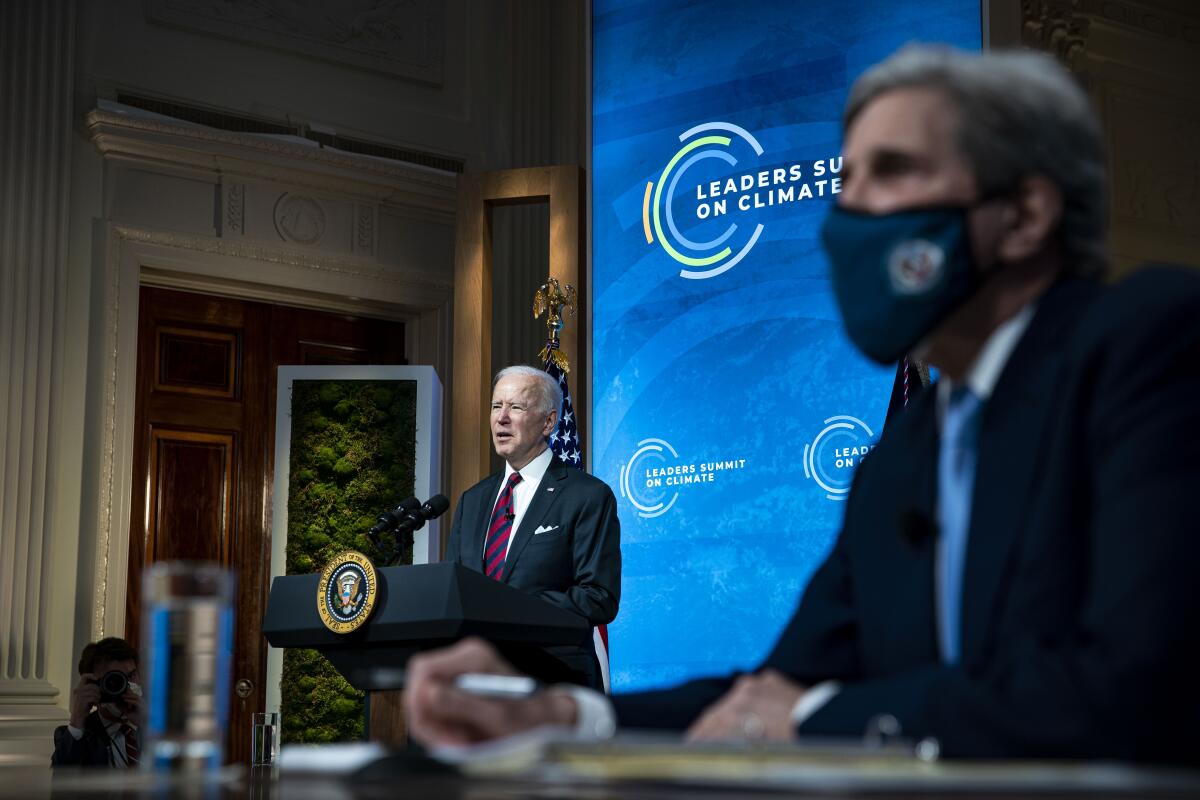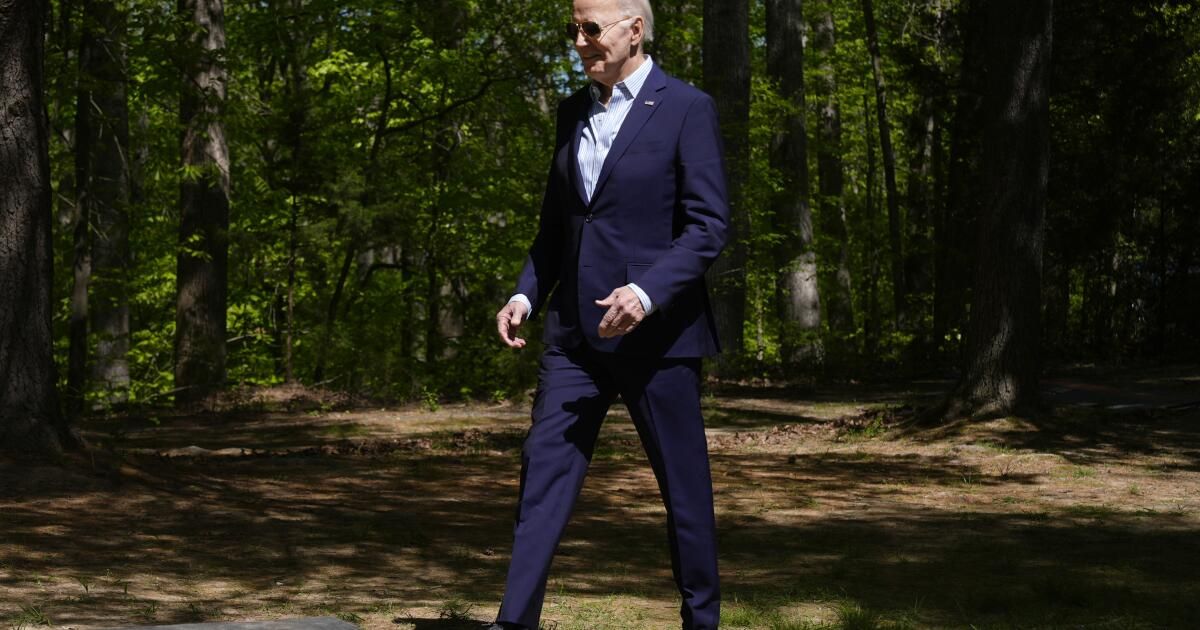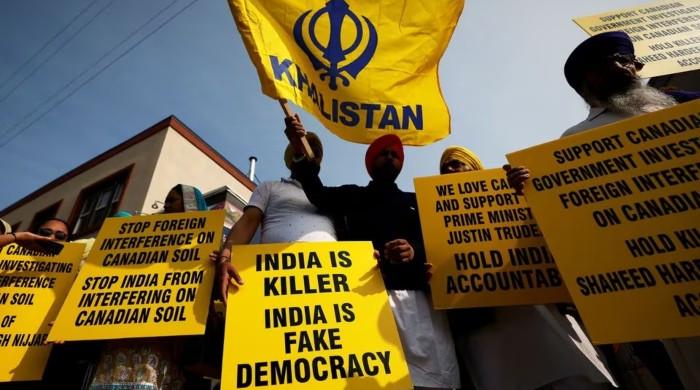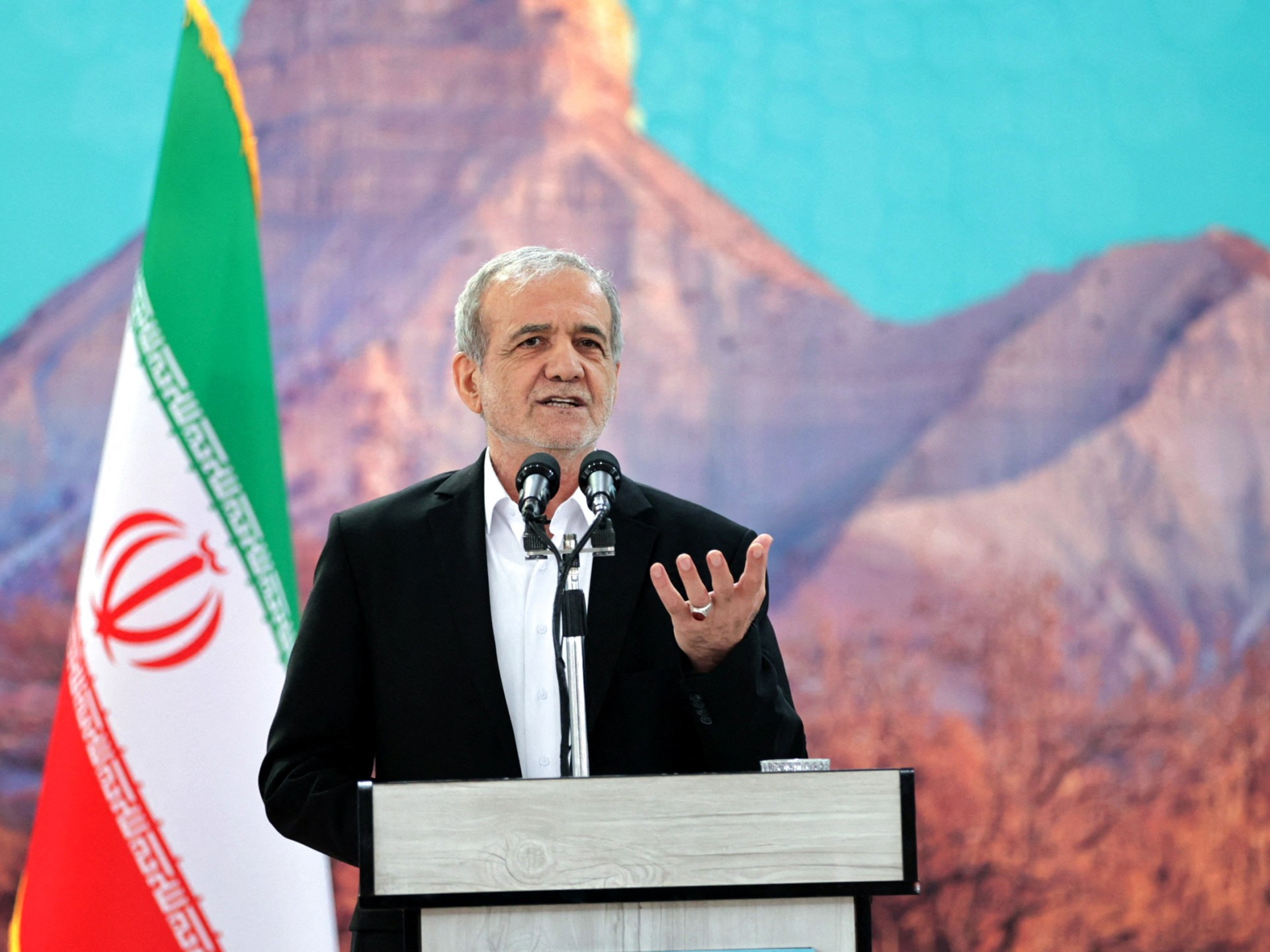President Biden spent his Earth Day in a national forest this year with an explicit speech aimed at young people: a climate jobs corps intended to excite Generation Z in the same way as John F. Kennedy's Peace Corps inspired his grandparents.
Biden took a selfie with Rep. Alexandria Ocasio-Cortez, the progressive Democrat from New York, to remind voters that he was the first president to truly embrace elements of his Green New Deal, signing a signature $369 billion spending package of dollars in 2022, the largest. climate bill in American history: to start the renewable energy revolution.
But Biden is not reaping the political benefits. His lead over former President Trump among voters under 30 has narrowed since 2020, when he won that group by 24 percentage points.
His current lead among younger voters is between single digits and high teens, according to a variety of polls. The Harvard Youth Poll conducted in March found Biden leading by a 19-point margin, but found that Trump voters (76%) were much more likely to say they were enthusiastic than Biden voters (44%).
And even on the climate issue, Biden and Trump are statistically tied among voters under 30, according to a CBS poll from April.
A 2019 photo provided by ConocoPhillips shows an exploratory drilling camp at the proposed site of the Willow oil project on Alaska's North Slope.
(Associated Press)
Many young voters don't know much about Biden's climate record, and many of the activists who helped fuel his 2020 victory are angry about his approval of a high-profile drilling project in Alaska and his response to the war between Israel and Hamas.
“Climate, of course, is one of the most important issues, if not the most important. But because so much attention is paid to other topics, maybe they're getting a little less attention,” said Isabel Hiserodt, a 20-year-old senior at Arizona State University.
Although Hiserodt is president of the university chapter of the Young Democrats in a key battleground state, she said she is personally most concerned about abortion access, which will likely be put to a statewide vote, and about Gaza, where she criticizes the approach. of Biden. Her choice of Biden “is not necessarily the happiest vote.”
An undecided voter in the process of moving from Arizona to Colorado, Ryan Williams, 25, said he has heard only a little about Biden's climate agenda, but is thinking more intensely about the economic policies of the two candidates, the most important topic for everyone. age groups, according to surveys. Climate change ranked 12th among the list of 16 issues in the Harvard survey, which found that young voters were most concerned about inflation, health care and housing.
It's “hard to say” how much the weather will affect your vote because “there are a lot of different things going on in my life that take priority over investigating what's going on in the government,” said Williams, an aerospace engineer who voted for Trump in 2016. and for Biden in 2020.
Part of the challenge for Biden is the nature of environmental policy. Biden's boldest changes are often buried in the language of the regulatory process, such as a recent rule change requiring fossil fuel plants to reduce their emissions. The shaky regulations curbing the impact of fossil fuels are far less compelling on social media than the Biden administration's decision last year to allow the Alaska drilling project, which inspired protest posts that drew hundreds of millions of views. on TikTok and elsewhere.
Many of the factories, jobs, car charging networks and cost savings promised in the $369 billion environmental spending bill known as the Inflation Reduction Act (and a second $1 trillion infrastructure bill) They will take years to achieve and may not be tied to Biden by voters.
The law also provides thousands of dollars in tax credits for electric cars and energy-saving home improvements, such as solar panels. But younger voters are not likely to be homeowners and even discounted, used or leased electric vehicles may be out of reach.
“That's a super direct way. You go and buy something and you get your money back. Well, that's just begun,” said Pete Maysmith, senior vice president of campaigns for the League of Conservation Voters, who will spend $120 million to promote Biden and other candidates this year.

Pro-Palestinian students created a tent city at the University of California, San Diego to protest the war in Gaza. Many of the activists who helped fuel President Biden's victory in 2020 are angry with his response to the war between Israel and Hamas.
(Gary Robbins/San Diego Union-Tribune)
Maysmith's group is trying to appeal to young voters with an animated YouTube video about how “Biden fleshed out Big Oil” by stopping new liquefied natural gas export terminals. He uses stick figures with Biden's head, stomping on a power plant with a stick foot.
Environmental advocacy groups are largely rallying around Biden and hope that as the election approaches, they can draw a contrast with Trump, who has called climate change a hoax and nonsense.
Trump made the coal industry the centerpiece of his 2016 campaign and has pledged to reverse Biden's efforts to reduce emissions from fossil fuel plants, embrace electric vehicles and limit oil and gas drilling. He repealed more than 100 environmental regulations, withdrew from the international Paris climate accord during his first term and promised that a second term would include repealing Biden's climate bill.
“It's a contrasting story,” said David Kieve, president of EDF Action, the Environmental Defense Fund's advocacy partner. “We have to remind people what a terrible president Donald Trump was on climate.”
Jack Pratt, who heads the EDF super PAC that will spend between $3 million and $6 million in the race, said younger voters, who came of age during a time of skepticism in politics, need to hear about the record. of Biden as part of a broader case. that he has done things.
Next Gen America, a youth-focused group funded by California billionaire Tom Steyer, is enlisting social media influencers as part of a “surround sound” approach to influencing young voters in eight states, largely part battlefields. Their polls in swing states have shown that the vast majority of young voters have heard of the Inflation Reduction Act, but do not associate it with Biden.
The Biden campaign is implementing a multi-pronged approach to these voters that includes visiting college campuses, summer concerts and other places, on and offline, where they can reach people, according to an official who would speak only without attribution. The message will be intertwined with arguments about the economy and other concerns because young people are not single-issue voters.
Adam Met, of the indie pop band AJR, visited campuses, posted videos and held events promoting Biden's climate record while he was on tour.
Rep. Ro Khanna agrees there is work to be done. The progressive Fremont Democrat and Green New Deal supporter recently took a college tour for the Biden administration in Wisconsin, another battleground, and said he observed climate was a second-tier issue, mentioned along with Gaza, behind abortion and the economy.

President Biden speaks during the virtual Leaders' Climate Summit at the White House in April 2021 as Special Presidential Climate Envoy John Kerry looks on. Part of Biden's challenge in attracting younger voters is the nature of environmental policy. His boldest changes often get buried in the language of the regulatory process.
(Al Drago / New York Times)
“We have to do a better job of reaching out in a way that gets their attention and we have to show up more,” he said. “I mean, some of these college campuses no one had been there because they were in rural communities.”
For many young voters, the void is being filled with criticism. Social media influencers were outraged that the Biden administration last year approved a drilling project, known as Project Willow, on Alaska's North Slope. Videos urging the administration to reject it sparked more than a million letters of opposition.
Elise Joshi posted one of the first TikToks about Willow, and it garnered over 300,000 views.
“Biden is not a climate champion if he approves an oil drilling project,” he wrote in the caption.
The 21-year-old recent UC Berkeley graduate leads a group called Gen-Z for Change that initially formed with a social media account called “TikTok for Biden” to oppose Trump. He has been heavily courted by the Biden administration, twice invited to the White House, including at the signing ceremony of the Inflation Reduction Act.
Now he says his support for Biden is a complicated issue, both because of frustration over Willow and the war between Israel and Hamas. She interrupted a speech to young voters by White House Press Secretary Karine Jean-Pierre to protest last summer's drilling.
“Objectively speaking, the most famous thing they've done on climate is approve the Willow project,” Joshi said. “They're working to recover from that.”
Joshi and other climate activists give the administration credit, but “we need 10 IRAs in the next 15 years if we really want to achieve our goals,” he said, using the acronym for the Inflation Reduction Act.
Zoe Blocher-Rubin, another active Democrat at Arizona State University, agreed that the social media barrage around Willow was “pretty overwhelming.” But like other social media scandals, it has faded. She and her peers are now more concerned about Gaza and abortion rights.
“Obviously, the climate is also important,” he said. “But we're used to people not acting enough.”












